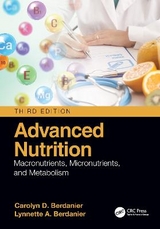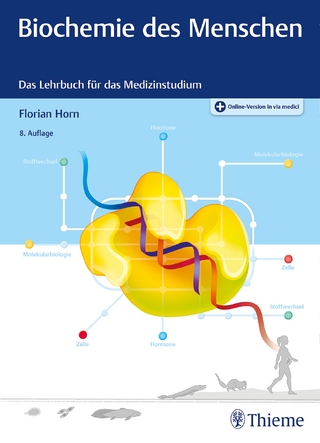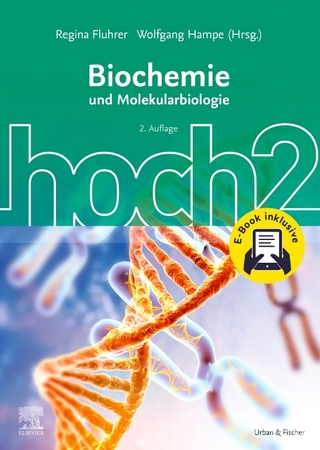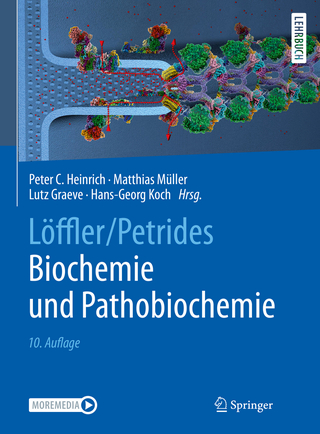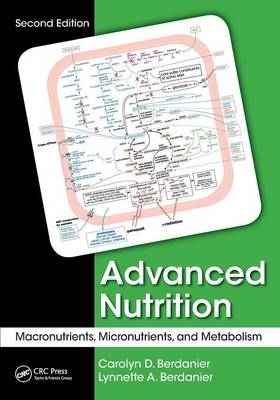
Advanced Nutrition
Apple Academic Press Inc. (Verlag)
978-1-4822-0517-6 (ISBN)
- Titel erscheint in neuer Auflage
- Artikel merken
The book incorporates fundamental concepts in nutrition science—while also acknowledging the contributions made by other sciences such as biochemistry, genetics, and physiology—in order to help us understand why specific nutrients are required. It provides comprehensive coverage of both macro and micronutrients, emphasizing each nutrient’s description, absorption, use, and excretion.
Highlights of the Second Edition include
Chapters addressing exercise, obesity, starvation, and trauma
Updates with respect to nutrigenomics and nutrient-gene interactions within specific topics
Expansion of the aging effects with regard to life cycle and nutrient-specific chapters
Nutrition requirement comparisons among different species and animal models for human diseases
The chemistry and physiology of each essential nutrient and its integration in the body
Chapter summaries, case studies, problem-solving activities, and critical thinking questions
Web addresses and expansion and updating of the reference lists at the end of each chapter
Ancillary material designed to enhance the teaching experience is provided for instructors on PowerPoint® slides.
Carolyn D. Berdanier is a professor emerita of nutrition at the University of Georgia in Athens, Georgia. She earned her BS from Pennsylvania State University, University Park, Pennsylvania, and MS and PhD from Rutgers University, Piscataway, New Jersey. She served as department head of Foods and Nutrition at the University of Georgia for 11 years before stepping down from this position to resume full-time research and teaching with a special interest in diabetes. Her research has been funded by a variety of funding agencies. Lynnette A. Berdanier is a lecturer in the Department of Biology at the University of North Georgia, Gainesville, Georgia. She teaches biology as well as anatomy, physiology, and medical microbiology. She earned her BS from the University of Nebraska, Kearney, Nebraska, and MS in physiology at the University of Georgia, Athens, Georgia. She served as a lecturer at Athens Technical College and at North Georgia College in Dahlonega prior to moving to her current position at the University of North Georgia in Gainesville, Georgia.
Energy
Definition
How Is Energy Measured?
Energy Intake
Energy Need
Energy Equation
Energy Terminology
Energy Retained
Energetic Efficiency
Utilizable Energy
Thermogenesis
Summary
Learning Opportunities
Multiple-Choice Questions
References
Negative Energy Balance
Set-Point Theory in Body Weight Regulation
Abnormal Energy States
Recovery from Malnutrition and Starvation
Trauma and Energy Needs
Voluntary Starvation: Anorexia Nervosa and Bulimia
Abnormal Appetite: Pica
Summary
Learning Opportunities
Multiple-Choice Questions
References
Positive Energy Balance
Obesity
Summary
Learning Opportunities
Multiple-Choice Questions
References
Regulation of Food Intake
Psychological Aspects of Food Intake
Physiological Aspects of Food Intake
Neuronal Signals for Hunger and Satiety
Summary
Learning Opportunities
Multiple-Choice Questions
References
Exercise
Definitions
Minimum Physical Activity Recommendations
Exercise and Nutrient Needs
Elite Athletes
Aging and Exercise
Summary
Learning Opportunities
References
Cell Cycle, Life Cycle
Cell Structure and Function
Receptors
Signal Systems
Cell Differentiation
Apoptosis
Life Cycle
Growth and Development
Conception to Birth
Birth to Childhood
Childhood and Adolescence
Maturity
Aging (Senescence)
Summary
Learning Opportunities
Self-Study Your Nutritional Status
Multiple-Choice Questions
References
Nutrigenomics
Genes
Gene Expression
Transcription
Translation
Genetic Diseases of Interest to Nutrition
Summary
Learning Opportunities
Problem Solving
Multiple-Choice Questions
References
Protein
Amino Acids
Protein Structure
Protein Denaturation
Classification of Proteins
Protein Analysis
Biological Value of Dietary Protein
Protein Use
Functions of Proteins
Protein Turnover
Protein Degradation
Protein Intake Recommendations
Protein and Amino Acid Interactions with Other Nutrients
Vegetarian Diets
Renal Disease
Integration of the Metabolic Features of Protein Nutrition
Summary
Learning Opportunities
Multiple-Choice Questions
References
Carbohydrates
Classification
Structure and Nomenclature
Digestion and Absorption
Metabolism
Abnormalities in the Regulation of Glucose Homeostasis: Diabetes Mellitus
Mutations Associated with Type 2 Diabetes
Other Health Concerns in Carbohydrate Nutrition
Carbohydrate Needs
Summary
Learning Opportunities
Multiple-Choice Questions
References
Lipids
Classification
Structure and Nomenclature
Sources of Lipids
Digestion and Absorption
Transport
Endogenous Lipid Transport
Genetic Basis for Lipoproteinemia
Defects in Exogenous Fat Transport
Diet Effects on Serum Lipids
Nutrient-Gene Interactions in Lipid Transport
Function
Fatty Acid Auto-Oxidation
Fatty Acid Auto-Oxidation and the Inflammation Cascade
Cancer and Dietary Fat
Other Diseases
Summary
Learning Opportunities
Multiple-Choice Questions
References
Fat-Soluble Vitamins
Vitamin A
Vitamin D
Vitamin E
Vitamin K
Summary
Learning Opportunities
Analysis and Problem Solving
Multiple-Choice Questions
References
Water-Soluble Vitamins
Ascorbic Acid
Thiamin
Riboflavin
Niacin, or Nicotinic Acid
Pyridoxine
Pantothenic Acid
Biotin
Folic Acid
Vitamin B
Carnitine
Choline
Inositol
Other Compounds That May or May Not Be Vitamins
Summary
Learning Opportunities
Multiple-Choice Questions
References
Macrominerals
Sodium
Potassium
Chloride
Calcium
Phosphorus
Magnesium
Summary
Learning Opportunities
Multiple-Choice Questions
References
Trace Minerals
Essential Microminerals
Trace Mineral Toxicity
Antagonisms and Interactions among Trace Minerals
Iron
Zinc
Copper
Selenium
Iodine (Iodide)
Molybdenum
Manganese
Cobalt
Other Minerals
Summary
Learning Opportunities
Multiple-Choice Questions
References
Appendix A
Glossary
Index
| Erscheint lt. Verlag | 1.4.2015 |
|---|---|
| Zusatzinfo | 127 Tables, black and white; 138 Illustrations, black and white |
| Verlagsort | Oakville |
| Sprache | englisch |
| Maße | 178 x 254 mm |
| Gewicht | 1021 g |
| Themenwelt | Medizin / Pharmazie ► Gesundheitsfachberufe ► Diätassistenz / Ernährungsberatung |
| Studium ► 1. Studienabschnitt (Vorklinik) ► Biochemie / Molekularbiologie | |
| Technik | |
| ISBN-10 | 1-4822-0517-3 / 1482205173 |
| ISBN-13 | 978-1-4822-0517-6 / 9781482205176 |
| Zustand | Neuware |
| Haben Sie eine Frage zum Produkt? |
aus dem Bereich
